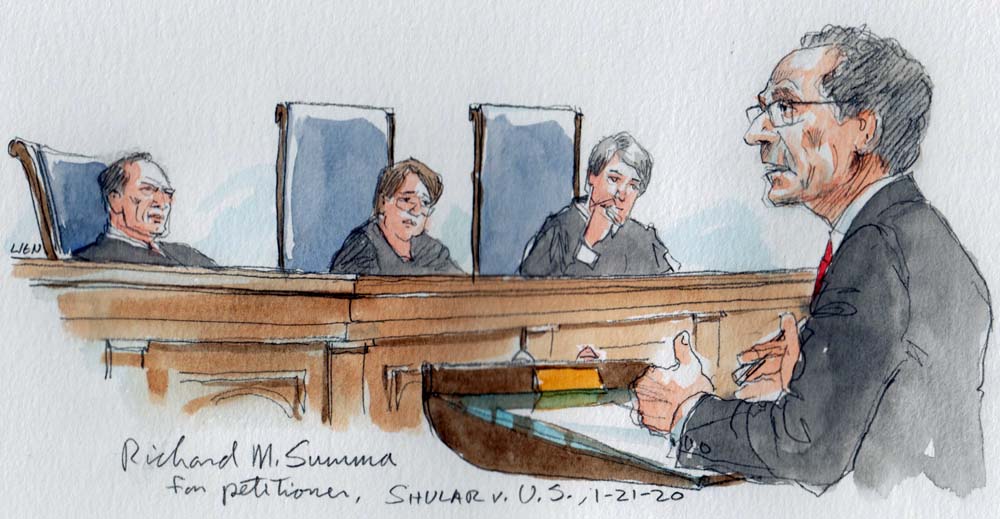Argument analysis: Another ACCA rabbit hole?
on Jan 21, 2020 at 9:53 pm

This morning, the Supreme Court heard argument in Shular v. United States. Shular asks the court to interpret the Armed Career Criminal Act’s definition of “serious drug offense.” Based on the argument, a majority of justices may be inclined to endorse the government’s interpretation of that phrase and expand the scope of the ACCA – though how much is unclear.
Eddie Lee Shular pleaded guilty to being a felon in possession of a firearm, an offense that typically carries up to 10 years’ imprisonment. Under the ACCA, however, offenders like Shular with three or more prior convictions for violent felonies or serious drug offenses are subject to a mandatory minimum term of imprisonment of 15 years.
Shular had several prior Florida drug convictions. He was sentenced under the ACCA after a court concluded that the Florida convictions qualified as serious drug offenses under Section 924(e)(2)(A)(ii). In Section 924(e)(2)(A)(ii), Congress defined a “serious drug offense” to include an “offense under State law, involving manufacturing, distributing, or possessing with intent to manufacture or distribute, a controlled substance … for which a maximum term of imprisonment of ten years or more is prescribed by law.” Shular is arguing that the words following “involving” describe either generic offenses that require criminal intent, which Florida law does not, or conduct that involves knowingly handling a controlled substance, which Florida law does not require. The government is arguing that the words following “involving” describe only conduct, regardless of a defendant’s intent.

Richard M. Summa for petitioner (Art Lien)
Justice Samuel Alito was the first to question Richard Summa, who represented Shular. Alito wanted to know if the main difference between Florida’s drug law and federal drug law is that under federal law, the prosecution has to prove that the defendant knew that the substance was a controlled substance, whereas under Florida law, a defendant raises his lack of knowledge as an affirmative defense. After Summa agreed with that statement, Alito expressed surprise that Shular’s brief had described Florida law as lacking a mens rea requirement. Justice Ruth Bader Ginsburg agreed with Alito’s observation.
Alito continued to press Summa, suggesting that the defendant’s hypotheses for what could qualify as a serious drug offense made “the distance between the law and the reality … bigger and bigger.” Alito suggested it was unlikely that a defendant would ever be subject to multiple prosecutions for unknowingly possessing a controlled substance, perhaps because a defendant with one conviction would figure out what substance they possessed going forward. And ACCA is aimed at repeat offenders, Alito noted, so the statute’s penalties are triggered only when a defendant has multiple prior convictions. Thus, Alito claimed, Shular’s fear that the government’s interpretation would extend to persons who unknowingly distributed or possessed drugs was misplaced.
Justice Elena Kagan invited Summa to explain why the words in the ACCA carry with them a requirement that the defendant possess a controlled substance knowingly. Both she and Justice Neil Gorsuch identified several textual difficulties with Shular’s suggestion that they do. First, elsewhere in the federal criminal code, Congress inserted the word “knowingly” before the words “manufacturing, distributing, or possessing,” which suggests that these three words don’t ordinarily contain a “knowingly” requirement. Second, one of the phrases in Section 924(e)(2)(A)(ii) specifically includes a mens rea element – possessing with intent to manufacture or distribute. But Congress did not include a similar criminal intent element for the other conduct described in Section 924(e)(2)(ii), manufacturing or distributing a controlled substance.
Assistant to the Solicitor General Jonathan Bond, representing the government, received some questions from Ginsburg, Gorsuch and Justice Sonia Sotomayor. Ginsburg asked how the government would prove that a defendant knew they possessed a controlled substance. Sotomayor and Gorsuch raised the possibility of hypothetical prosecutions that the defendant had warned about—such as a mailman who is prosecuted for delivering a package that happens to contain a controlled substance. Justice Stephen Breyer and Gorsuch asked whether the government’s interpretation would sweep in prior convictions that only tangentially or remotely involved controlled substances. Alito also asked Bond some questions, most of which seemed designed to elicit agreement with Alito’s proposed responses to his colleagues’ questions.
Several justices raised the specter of the court’s struggle with other provisions in the ACCA. Gorsuch asked the government whether its interpretation of the ACCA invited a vagueness challenge because of the potential uncertain reach of the phrase “involves.” (The government is arguing that a state offense involves manufacturing, distributing, or possessing if the offense necessarily entails that conduct. Some courts of appeals have concluded that an offense necessarily entails conduct if the offense relates to the conduct.) Chief Justice John Roberts jokingly urged the government to “keep … in mind” the difficulty of “attempting to synthesize generic versions of these offenses” “the next time you urge us to adopt a generic approach.”
Although Breyer’s skeptical questioning of the government is often a good sign for a criminal defendant, it is unclear if there are five votes for Shular. Some of the court’s textualists had serious misgivings about Shular’s interpretation, and several justices seemed eager to disavow that interpretation to the extent it required courts to construct generic definitions of offenses.
The one concern with the government’s interpretation that seemed to unite several of the justices (including unusual bedfellows Gorsuch and Breyer) was the uncertain and potentially expansive reach of the government’s interpretation of the ACCA. Time will tell whether the court is willing to throw the dice and take the risk of going down another ACCA rabbit hole, this one about the possible reach of the word “involving.”
Editor’s note: Analysis based on transcript of oral argument.


